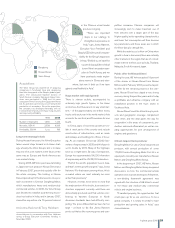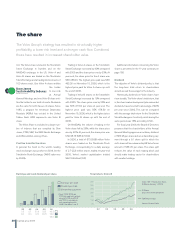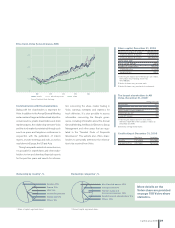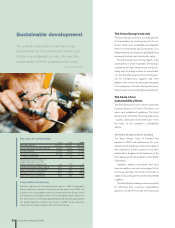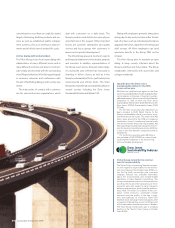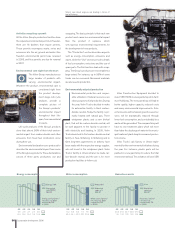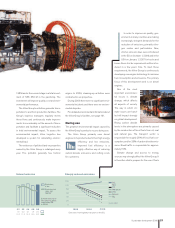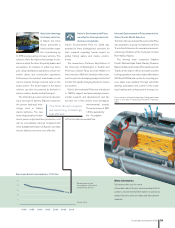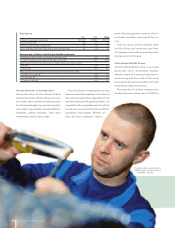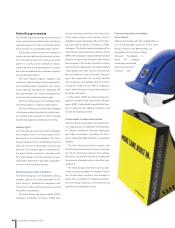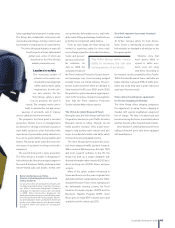Volvo 2006 Annual Report Download - page 39
Download and view the complete annual report
Please find page 39 of the 2006 Volvo annual report below. You can navigate through the pages in the report by either clicking on the pages listed below, or by using the keyword search tool below to find specific information within the annual report.
ational responsibility. All production facilities
have environmental coordinators. Issues relat-
ing to emission levels, fuel consumption and
choice of materials are handled by the develop-
ment departments in the respective business
areas and the Group-wide development units.
Every business area has an environmental
manager. The Volvo Group also has internal
consultants with specialized expertise in areas
such as chemicals, life cycle assessments,
environmental audits and environmental pro-
tection.
Environmental targets
The Group’s environmental targets are used
for follow-up purposes throughout the organi-
zation and are closely linked to its business
plans. The Volvo Group’s environmental targets
can be summarized in the following environ-
mental challenges.
The challenges facing production are:
• Reducing energy consumption by 50% per
produced unit by 2008 compared with 2003
• Doubling the use of carbon-dioxide neutral
energy by 2008 compared with 2003
• Terminating all use of oil and coal for the heat-
ing of facilities.
Challenges regarding product use:
• Achieving high fuel efficiency and low emis-
sions throughout product life cycles
• Measuring against the best
• Consistently carrying out activities to become
the industry leader
• Producing environmental data for follow-up
and communication for each new product
developed
• Implementing a strategy for tomorrow’s fuels
• Including alternative fuels and alternative
drivelines in product plans.
In production
Volvo Group has production facilities on every
continent, ranging from state-of-the-art, highly
automated factories to small-scale produc-
tion.
Regardless of size and location, all produc-
tion units must meet the Group’s minimum
requirements for environmental performance.
These requirements include guidelines for
chemical use, energy consumption, air and
water emissions, waste management, environ-
mental organization and improvement efforts.
If local laws and regulations are more compre-
hensive than the Group’s requirements, they
must be followed. Most factories meet the
requirements by a wide margin and are show-
ing constant improvement.
Regular environmental audits
Since 1989, Volvo has been carrying out envir-
onmental audits to ensure that all the plants
comply with the Group’s environmental policy.
The Volvo Group has insurance coverage for
environmentally related damage to its immedi-
ate surroundings, for instance in the event of
unexpected emissions. Newly acquired com-
panies and properties are subjected to due
diligence examinations which, in addition to
financial and legal aspects, also examine envir-
onmental factors and risks.
Environmental
management system
Volvo’s Group-wide environmental policy is one
of the primary instruments for guiding Volvo’s
environmental efforts. This policy forms the
basis for the Group’s environmental manage-
ment system, strategies and targets, reviews
and measures.
The environmental policy states that the
Volvo Group’s environmental program shall be
characterised by a holistic view, continuous
improvement, technical development and effi-
cient use of resources. The policy is in turn bro-
ken down into strategies and targets for the
organization.
An environmental management system is a
tool for monitoring an organization’s specific
environmental impact. The Volvo Group’s first
system was certified in 1995. There are also
environmental management systems for other
parts of the value chain, such as product devel-
opment and marketing. At the end of 2006,
99% of the employees in the Group’s produc-
tion units were working according to certified
environmental management systems, primarily
ISO 14001:2004.
The environmental policy states a commit-
ment to expanding the Group’s environmental
program to include collaboration partners, for
instance suppliers and distributors. Environ-
mental demands on suppliers were introduced
in 1996 and are used as an integrated part of
the evaluation of suppliers and for follow-up of
various purchasing organizations.
Responsibility for environmental work at
production facilities is a normal aspect of oper-
Environmental responsibility
Environmental management is a cornerstone of the Volvo Group’s sustainable develop-
ment efforts. Environmental care is also one of the Group’s corporate values. Volvo’s
environmental work is long-term and methodical and has two clear targets: reducing
envir onmental impact from production, and reducing environmental impact from product
use.
During 2007 windpower plants will be built adjacent
to the Volvo Trucks plants in Gent and Göteborg.
Sustainable development 2006 35






